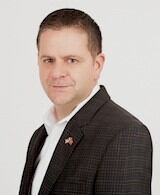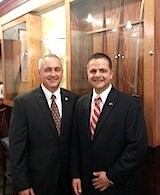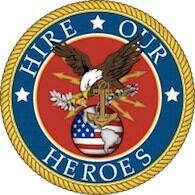Bureau of Labor statistics on unemployment in America tell an unpleasant story. Between 2009 and 2011 unemployment among civilians age 18–24 who had never been in military service remained consistently around 16 percent. Unemployment among America’s military veterans in that same age range, however, jumped from around 20 percent in 2009 and 2010 to 30 percent in 2011.
Dan Caporale knows what it’s like to transition from military service with a respected position and guaranteed paycheck to being a civilian pounding the pavement looking for a job. Today he is the chairman and founder of Hire Our Heroes, (a.k.a. HOH) a not-for-profit organization “founded by veterans for veterans” to help transitioning military personnel in being more employable and assist them in meeting employers looking to hire veterans. On April 2, 2014, Caporale spoke with HistoryNet‘s senior editor, Gerald Swick, about what Hire Our Heroes does.
***
HistoryNet: To begin with, what is Hire Our Heroes? What is its mission?

Dan Caporale: Our goal is to assist transitioning veterans coming out of the service, to help bridge the gap and provide them with the skills necessary to secure employment. Prior to getting out of the service, the government only invests about one week to prepare them for the real world — all veterans are required to go through the one-week Transition Readiness Seminar (TRS), regardless of whether they have one year or 50 years of service. We try to give veterans the missing pieces they need to become successful in their transition to the civilian world.
HN: You founded Hire Our Heroes in 2013, but you’ve been working to support veterans much longer than that. Tell us a bit about yourself and how you came to establish Hire Our Heroes.
DC: I got out of the Marine Corps/Marine Corps Reserve after a total of eight years. I was a Comm (Communications) guy and after going through three separate schools and obtaining three separate MOS’s (Military Occupation Specialties), in the end I was a satellite communications specialist … I was a young sergeant at the time, thinking I had all these great skills, so I was going to be very employable. I had big dreams and thought maybe NASA or one the big government agencies would scoop me up. They didn’t, and like so many today I felt like I was an island by myself.
A buddy said, “Hey, why don’t you come work with us?” He was working with a temporary staffing agency that placed people with technical skills. I stepped into the staffing industry and stayed in it. I decided I was going to try to help veterans because I remember how I felt looking for work after getting out of the service. The problem for ex-service personnel finding employment just continued getting bigger and bigger as more and more people got out of the military.
I was then introduced to and hired Master Gunnery Sgt. Tim Kirk, who was retiring from the Marines after 25 years. After I hired Tim to join the organization I was representing at the time, I immediately started passing veterans’ resumes to him at a rapid pace; at the same time he had his own stack of veterans’ resumes he was sending back to me. We were asking each other, “How did you get all these veterans on your list?” We both came to the agreement that, “we ought to do something about the issue. The issue wasn’t getting any better.”
The defining moment was when my former commanding officer, now a full-bird colonel, was getting out of the service. He called me and said “Hey Caporale, I need a job. Can you help me?” I thought: Wow!—if a full-bird colonel needs help, we need to do something. It was time to stand up and make our core mission helping veterans. So we started Hire Our Heroes. (Retired Master Gunnery Sgt.Tim Kirk is the vice-chairman and a co-founder.)
HN: In your opinion, what are the biggest issues veterans face when they go from the military to civilian life?
DC: Put simply, they don’t know what they don’t know. Some military personnel are proactive in planning for transition; they may start 18 months before getting out. Others wait till they are 30 days from getting out and realize they need a job.

Dan Caporale (right) and Tim KirkTransition begins when you get in the door of the military. You need to ask yourself then, am I going to make the military my career and what am I going to do when I get out? These veterans, men and women, do a good job in the service they swore to uphold, but they aren’t prepared for the time when they get out. Everyone has to get out at some point — more now than ever with the cutbacks and downsizing of our Armed Forces.
They’re really trying to understand how they’re going to fit into society. Some have unbelievable skills — the government has invested quite a bit of money in training these service members — but sometimes they have difficulty converting their military skills to civilian skills. Some have false expectations on salary: some think they aren’t worth anything, some think they are worth more than what they are actually going to be offered.
Not spending enough time thinking about it, about the transition back to civilian life, before getting out is where the problem really starts.
HN: As you said, they don’t know what they don’t know. A veteran may not even know what questions to ask in relation to transitioning from military service to civilian life, beyond “How do I find a job?” If a veteran contacts you for assistance, what do you tell that person, generally speaking?
DC: There are a couple things we like to do up front. We find out where they are in their transition process: are they getting out in two years or 30 days? Most that we talk to are already out or getting out within the next month. The ideal scenario for all would be for us to start working with them 18 months before they get out.
We talk with them to find out what motivates them most. Is it location, quality of life, compensation? When we find out which of those silos is their hottest we’ll start to build a profile or personal brand around them.
We then start to shape, mold, and mentor, to help the vets to identify their path and to work on translating their military skills to civilian skills. We get them to start putting it all down on paper, to create their resume and start to build a personal brand. We’re not saying, “We’ll find you a job tomorrow.” We tell them, “We’re helping you build your personal brand so you’re ready to build a career.” We have them start networking. We might have them start on LinkedIn, to get a picture up there and make sure they’re starting to market themselves.
HN: But what do you do when a transitioning vet says, “I need a job now.”
DC: That’s the majority we talk to. We peel back the onion a little bit. We make sure their resume is squared away. We give them some creative criticism. We task them with a few things they are to do when we get off our initial call, and we have them circle back once completed.
Some companies and nonprofits do reach out to us, asking where they can hire a veteran. If the vet has a resume prepared and is a good fit, hopefully they will get the chance to be employed.

There are other organizations working to assist transitioning veterans. Some even have names similar to Hire Our Heroes, and they are also trying to help vets find jobs, but what differentiates us is what we do. Several other nonprofits are doing great things, some other groups might put on job fairs; I’m not a fan of job fairs. Veterans create a resume, and then they do what they’re taught: go to job fairs, attempt to hand out stacks of resumes, and bring home a stack of business cards. Then they wait 60-90 days, and when they haven’t heard from any of the companies, they go to another job fair and toss their resumes into a black hole again. We try to get them off of the Ferris wheel of those job fairs and get them doing professional networking. We take more of the personal approach and offer more hands on training to develop themselves.
HN: Is there any cost to veterans for using Hire Our Heroes’ services?
DC: There is never any cost for veterans to use and access any of our services. It pains me to hear that any veteran spends a dime on anything as it pertains to transitioning and finding employment. They should never pay for a resume and or a headhunting fee.
HN: Does your organization actively partner with corporations or other entities where veterans might find employment?
DC: We do. Companies reach out to us every day, which is great. There are companies out there saying, “We need to hire veterans, we want to hire veterans.” And there are veterans saying, “I need a job,” so the big thing is connecting the dots. We present opportunities on our website, we send out email blasts, and post to social media to let veterans know who we’re working with and that these companies are looking for someone with specific skills.
We work directly with these companies, too. When one of them says, “We need somebody with this specific profile,” we search our databases and put out the word: Does anybody know someone with these kinds of skills?
We can never have enough companies contacting us. There are plenty of veterans out there looking for work.
HN: How should a company that is interested in hiring veterans contact you?
DC: On our website there’s a button that says “For Corporations.” Just click on that, fill out the short form, and we will follow up. Some companies need to be educated about hiring veterans. Sometimes it is different than a typical civilian hire.
An HOH seminar. ‘We try to get them off the Ferris wheel of those job fairs and get them doing professional networking.’Most of hiring in America today is done by small-to medium-size businesses. One of the value-adds we bring to companies is — well, say we’ve got a vet coming out of Quantico who might be from the Midwest, the West Coast — wherever. He or she wants to go back home but can’t afford to go out there without a job. The veteran can’t afford to fly out just for the job interview and the small companies might not have the budget to fly them out, either. We can offer to fly them free anywhere Southwest Airlines flies. We partnered with another great non-profit, the Armed Forces Foundation (AFF), to be able to provide this service.
Last week, a veteran called me and said, “I have the opportunity for a final interview in California.” That’s what we’re looking for in this free flight program, someone who has already gone through initial interviews on the phone or by Skype and is at the stage of a final face-to-face interview. When you’re looking for a job, it can be tough to spend several hundred bucks for a ticket. That’s where we can help out. He called us on Monday, and I booked him a ticket for Thursday. He interviewed Friday, had a second face to face on Saturday. He stayed on a base in San Diego on Sunday; it cost maybe 20 dollars. He flew back home on Monday. We picked up his tab.
HN: On your website, you have a section that talks about mentoring. What role do mentors play, in relationship to your mission, and how would someone go about becoming a mentor?
DC: Mentors are important. Veterans are coming out the door and realizing Uncle Sam isn’t there anymore to provide guidance. We’re looking for successful professionals who want to give back and who have a couple of hours a month to talk with a veteran over the phone or in person to give advice and guidance.
When prospective mentors contact us, we check their background, and we make sure they are successful professionals. We see where they are located and what kind of opportunities they can offer to veterans. The veteran and mentor both sign a commitment for one year, two hours a month minimum. If they want to go beyond that two hours a month, they can. Some veterans stick with it for a year, some drop out, feeling they’ve accomplished what they wanted to and they move on. Basically, the mentoring program is connecting veterans to business leaders. Anyone interested in mentoring can sign up online at our website.
HN: As a not-for-profit, you accept donations, which can be made through your website. You’re also looking for volunteers to work with your organization. What should anyone interested in applying do?
DC: Yes, we accept donations through our website or by mailing a check directly to our nonprofit headquarters 202 Church Street, SE. #526 Leesburg, VA 20175. We are able to offer our services because of private and corporate donations.
We are always looking for volunteers; we can never have enough. As of today we could really use experienced volunteer grant writers and a volunteer fundraising-event coordinator in the Washington, DC, Metro area. Anyone interested in applying can either do visiting our website or by going to http://linkd.in/1spWIUX
HN: Thank you for taking time to talk with HistoryNet. Are there any thoughts you’d like to add in closing?
DC: The earlier that veterans reach out to us, the better. First, they need to recognize that they need help. Things are different in the civilian world. We’ve helped everyone from generals down to enlisted personnel. We’re not curing world hunger, but we’re here every day and working with businesses and nonprofits across the country. This is what I live for. I eat, sleep and breathe this every day. There’s nothing better!
Our military today is a volunteer force. Only one percent of Americans step up and give to our country through military service. It’s our turn to step up and help these veterans.





